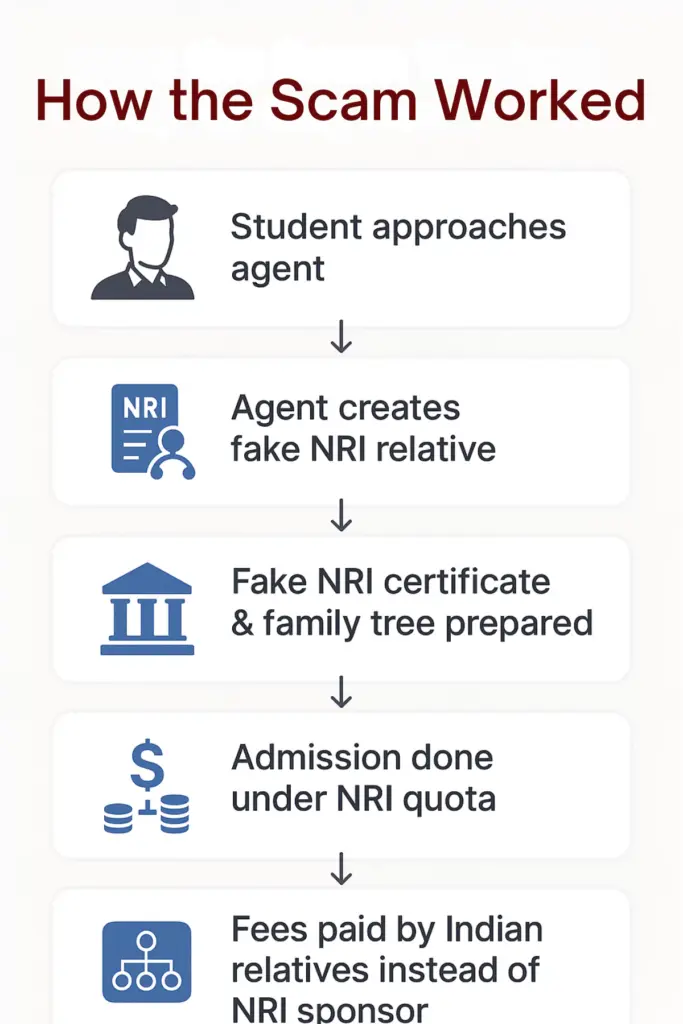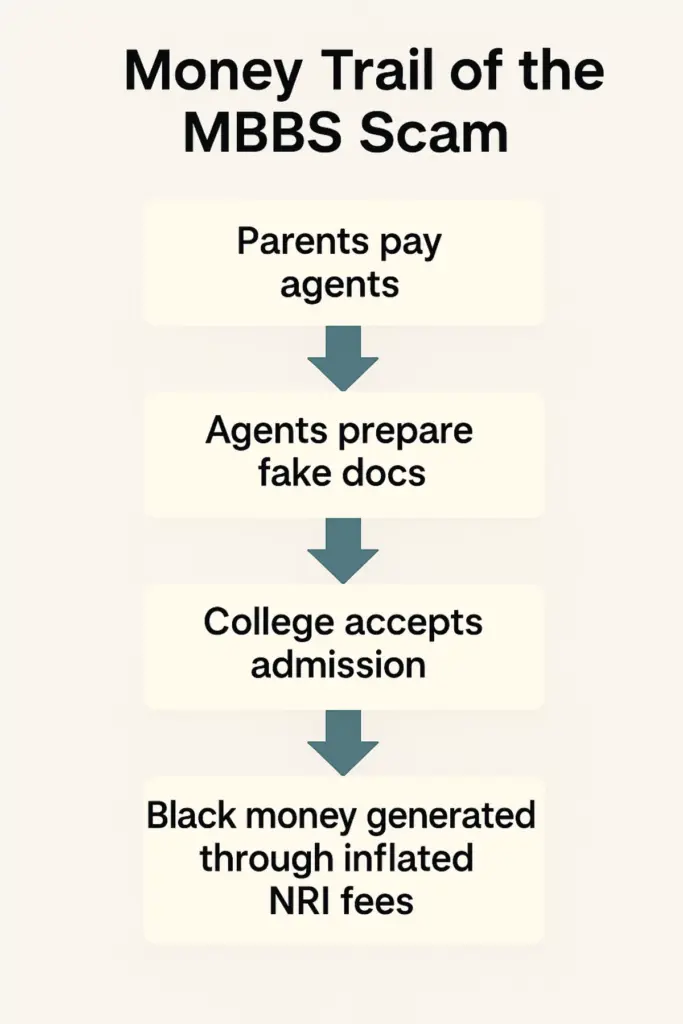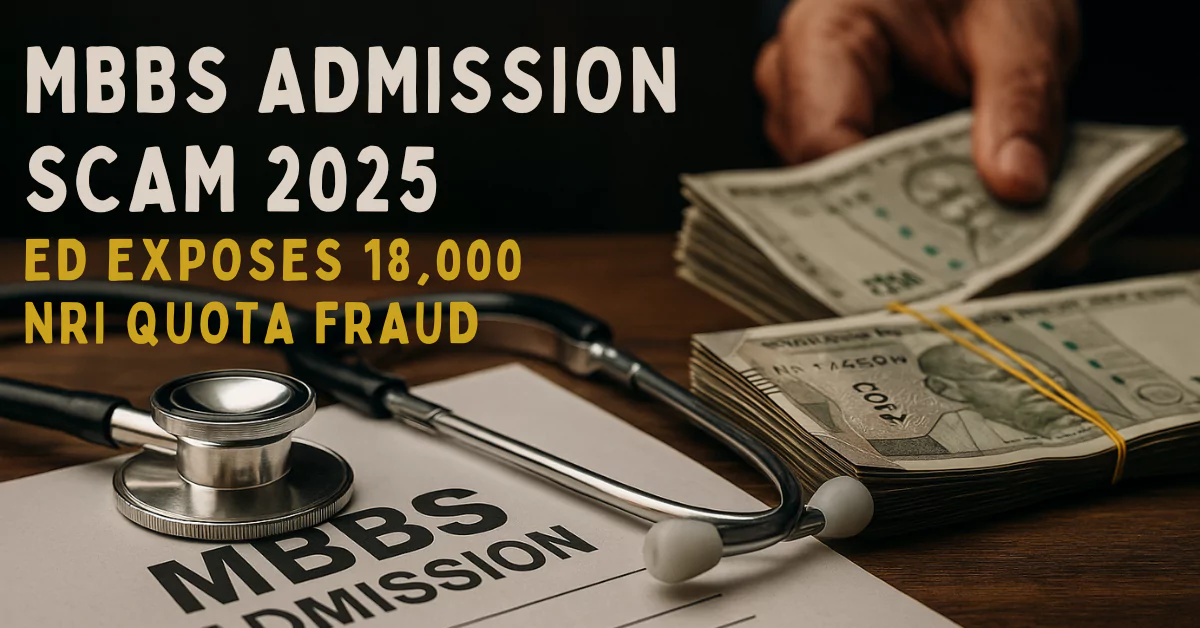MBBS Admission Scam 2025: The Enforcement Directorate (ED) exposed a large scale fraud in medical college admissions under the NRI (Non-Resident Indian) quota, exposing how private colleges, middlemen, and fake sponsors colluded to admit nearly 18,000 students on forged documents.
Recently, Kolkata Zonal office ED found fake NRI Quota admissions in West Bengal and Odisha, finding a large-scale admission scam in private medical colleges. These colleges, in partnership with agents, were illegally selling MBBS and other medical seats under the NRI quota to ineligible students despite skyrocketing MBBS NRI Quota Fees.
This scam not only denied genuine aspirants their rightful MBBS and PG seats but also turned the NRI quota into a cash machine for corrupt institutions.
How the MBBS NRI Quota Scam Worked
Investigators found that students, parents, and admission agents manipulated the NRI quota through fake paperwork.
Key Methods Used:
- Fake NRI Certificates: Forged embassy seals and notary stamps (especially from the US) were used.
- Bogus Family Trees: Students were falsely linked to NRIs as “relatives.”
- Indian Relatives Paid Fees: Instead of NRI sponsors, local families deposited fees in Indian rupees.
- Recycled Documents: The same set of fake papers was used for multiple students.

ED Investigation and Raids
The ED launched nationwide raids on private colleges, seizing stacks of fake NRI certificates. With help from the Ministry of External Affairs and Indian embassies, investigators cross-verified thousands of documents.
Findings shocked the probe team:
- Majority of certificates were fake.
- Some NRIs were bribed to lend their names for illegal admissions.
- Fake seals of US notary officials were widely used.
| The Directorate of Enforcement (ED) is a multi-disciplinary organization mandated with investigation of offence of money laundering and violations of foreign exchange laws. The statutory functions of the Directorate include enforcement of following Acts: 1. The Prevention of Money Laundering Act, 2002 (PMLA) 2. The Foreign Exchange Management Act, 1999 (FEMA) 3. The Fugitive Economic Offenders Act, 2018 (FEOA) 4. The Foreign Exchange Regulation Act, 1973 (FERA) 5. Sponsoring agency under COFEPOSA |
Financial Impact of the Scam
By exploiting the NRI quota, colleges charged higher tuition fees while bypassing the rule that fees must be paid in foreign currency. Instead, Indian families made the payments, defeating the policy’s foreign exchange objective.
Experts estimate that this fraud generated hundreds of crores in black money, laundered through college accounts and agents.

The scam damages India’s medical education credibility and highlights loopholes in private college admissions.
NRI Quota’s Original Purpose:
- To attract foreign currency inflow
- To provide seats for genuine NRI students
What Happened Instead:
- Indian students misused quota with fake sponsors
- Colleges profited by selling seats
- Genuine NRI students lost opportunities
Future Course of Action
- More Arrests Likely: ED has hinted at criminal charges against college authorities and admission agents.
- Policy Reforms: The National Medical Commission (NMC) may introduce stricter verification rules for NRI quota admissions.
- Transparency Push: Experts demand that all NRI quota admissions be verified directly through embassies and digital databases.
The MBBS admission scam exposes how loopholes in the NRI quota turned into a corruption hotspot. With 18000 fake admissions, the racket highlights the urgent need for transparent and technology-driven verification in medical education.
If left unchecked, such scams will continue to deny meritorious students their rightful chance and erode trust in India’s medical education system.


Cancel the nri quota convert to government quota
The Supreme court urged to use NRI quota as a holistic approach to fund the economically disadvantaged but meritorious students, fund infrastructure and be inclusive to Indian diaspora, but it has been being misused.